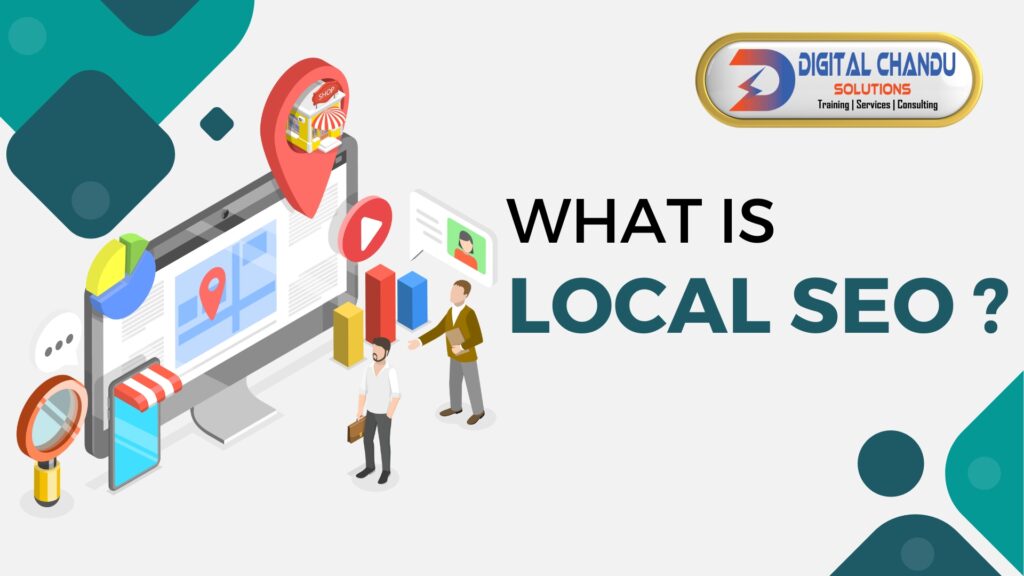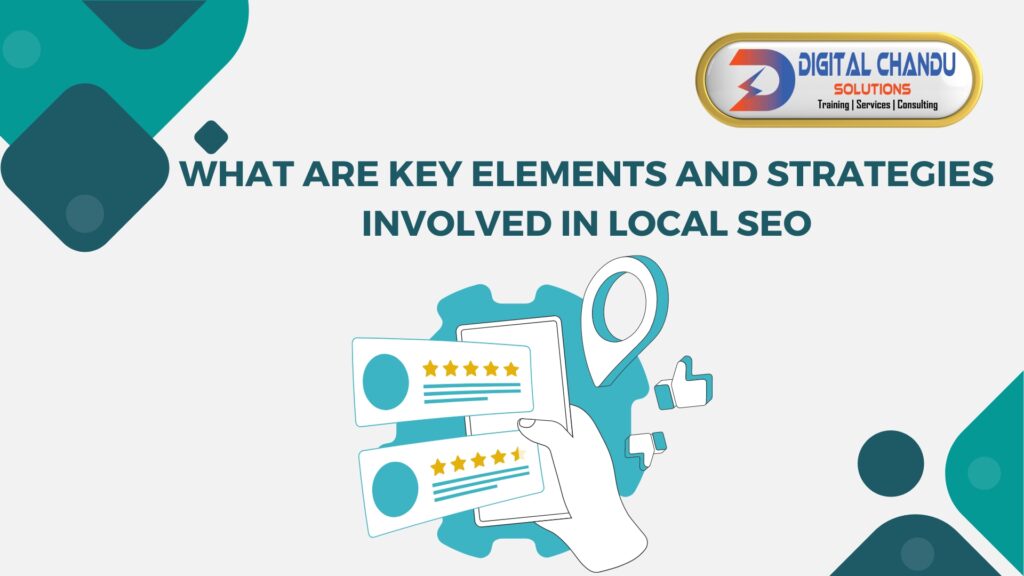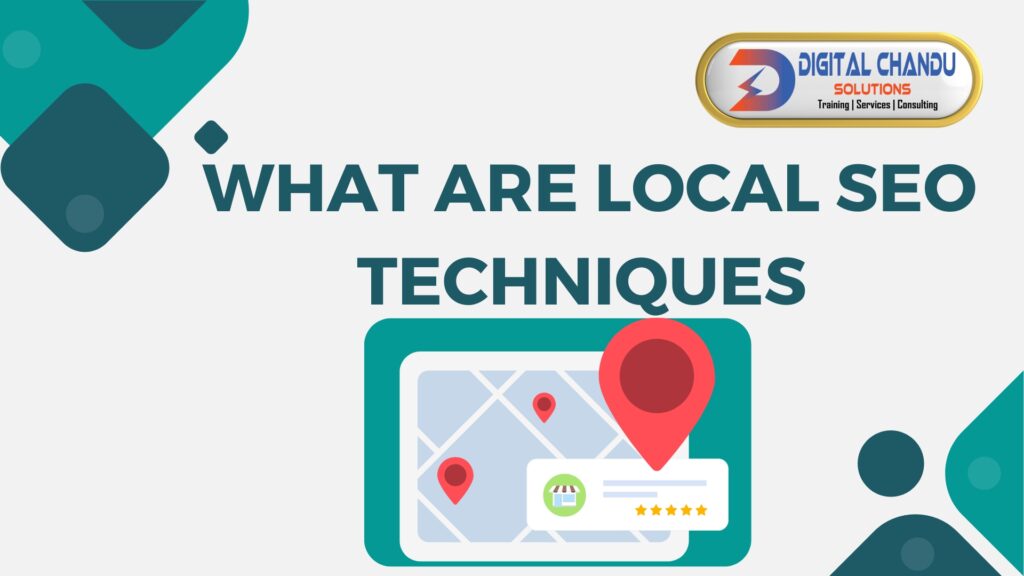The Power of Local SEO: Strategies to Dominate Local Search Results
What is Local SEO ?
Local SEO, short for Local Search Engine Optimization, refers to optimizing a business’s online presence to attract more customers and improve visibility in local search results. It focuses on specific geographic locations where the business operates or serves customers. Local SEO aims to increase the business’s online visibility for local searches related to its products or services.

Importance of Local SEO
The digital landscape has shifted dramatically, with more people relying on smartphones and computers to discover local businesses. Local SEO ensures that your business is aware of the vast online space but instead stands out to local customers actively seeking what you offer.
Importance of Local SEO for Businesses
Local SEO isn’t just a marketing strategy; it’s a fundamental necessity for businesses looking to thrive in their local markets. Here’s why Local SEO is crucial for your business’s success:
Enhanced Visibility: Local SEO ensures that your business appears prominently in local search results, making it easier for potential customers to find you.
Targeted Traffic: By targeting specific geographic areas, Local SEO drives highly relevant traffic to your website, increasing the likelihood of conversions and sales.
Builds Trust: Positive reviews, accurate information, and a strong online presence through Local SEO build trust and credibility with customers.
Competitive Edge: Outranking competitors in local search results gives you a competitive advantage, helping you capture market share and expand your customer base.
Maximizes Opportunities: With more consumers using mobile devices to search for local businesses, Local SEO ensures you take advantage of valuable opportunities to connect with potential customers.
By prioritizing Local SEO and implementing effective strategies, businesses can create a robust digital footprint, attract quality leads, and foster long-term relationships with customers in their local communities.
What are Key elements and strategies involved in Local SEO:
Google My Business (GMB): Creating and optimizing a Google My Business profile is crucial for local SEO. It includes providing accurate business information such as name, address, phone number (NAP), business hours, website URL, and categories. Optimizing GMB helps businesses appear in Google Maps and local search results.
Local Keywords: Targeting local keywords is essential. These search terms include geographic modifiers like city, neighborhood, or region. For example, “plumbing services in New York” or “best pizza restaurant near me.”
On-Page Optimization: Optimizing website content, meta tags, headings, and URLs with local keywords. This helps search engines understand the relevance of the website to local searches.

Local Citations: Ensuring consistent business information across online directories, citation sites, and social media platforms. Consistency in NAP details (Name, Address, Phone Number) is critical for local SEO.
Online Reviews: Encouraging positive reviews from satisfied customers on platforms like Google, Yelp, and Facebook. Positive reviews enhance credibility and trustworthiness, influencing potential customers’ decisions.
Local Link Building: Acquiring backlinks from local websites, directories, and industry-related sources. Local backlinks improve website authority and relevance for local searches.
Mobile Optimization: Ensuring the business website is mobile-friendly and provides a seamless user experience. Mobile optimization is crucial as many local searches occur on smartphones.
Google Maps Optimization: Optimizing business listings on Google Maps, including accurate location details, business descriptions, photos, and customer reviews.
Schema Markup: Implementing schema markup on the website to provide search engines with structured data about the business, such as business hours, reviews, and contact information.
Localized Content: Creating localized content that addresses local interests, events, news, and community activities. Localized content helps attract local audiences and improves search engine rankings for local queries.
Common Local SEO Strategies
Businesses employ several proven strategies to enhance their Local SEO efforts, such as:
Optimizing Google My Business Profile: Providing comprehensive and up-to-date information about your business.
Creating Localized Content: Developing content that resonates with local audiences and addresses their needs.
Encouraging Customer Reviews: Soliciting feedback from satisfied customers and responding promptly to reviews.
Monitoring and Analyzing Performance: Using analytics tools to track performance metrics and make data-driven decisions.
Staying Informed: Keeping abreast of industry trends and algorithm updates to adapt strategies accordingly.
What are Benefits of Local SEO
Implementing effective Local SEO strategies offers numerous benefits, including:
Increased Online Visibility: Appearing higher in local search results, leading to more visibility and exposure.
Targeted Traffic: Attracting highly relevant traffic from local customers who are actively searching for your products or services.
Enhanced User Experience: Providing a seamless and user-friendly experience across all mobile devices.
Building Trust and Credibility: Earning positive reviews and establishing a strong online reputation that instills trust in potential customers.
Competitive Advantage: Outrank competitors in local search results and gain a competitive edge in your industry.
What Are Local SEO Techniques
On-Page Optimization: Optimizing website elements for local relevance, including content, meta tags, and URLs.
Off-Page Strategies: Building authority through quality backlinks from local and industry-specific sources.
Google My Business Optimization: Leveraging Google’s platform to showcase your business and engage with customers.
Local Citations: Ensuring accuracy and consistency across all online directories and citation sites.
Customer Engagement: Encouraging reviews, responding to feedback, and actively engaging with the local community.
Mobile Optimization: Ensuring a responsive design and fast-loading pages for an optimal mobile experience.
Local Keyword Research: Identifying and targeting keywords that align with local search intent and user behavior.

Factors Affecting Local SEO
Several factors influence the success of Local SEO campaigns, including:
Relevance and Proximity: How well your business matches user intent and its proximity to the searcher’s location.
Website Authority: The credibility and authority of your website are determined by factors such as backlinks and domain age.
User Engagement: Metrics like click-through rates, bounce rates, and time on site indicate user satisfaction and engagement.
NAP Consistency: Ensuring consistency in Name, Address, and Phone Number (NAP) across all online platforms.
Local Link Building: Acquiring high-quality backlinks from local sources and industry-related websites.
Tips for Local SEO Success
To maximize the impact of your Local SEO efforts, consider these actionable tips:
Optimize Your Google My Business Profile: Complete all sections, upload high-resolution photos, and encourage reviews.
Create Hyper-Local Content: Develop content that speaks directly to your local audience’s interests and needs.
Leverage Customer Reviews: Respond to reviews, address feedback promptly, and showcase positive testimonials.
Monitor Performance Metrics: Use analytics tools to track key performance indicators and adjust strategies accordingly.
Stay Ahead of Trends: Keep up with industry updates, algorithm changes, and local search trends.
Advanced Local SEO Keyword Research
Keyword research is the cornerstone of any successful Local SEO strategy, especially for service-based businesses targeting specific geographic areas. Here’s an advanced and detailed guide to conducting comprehensive local SEO keyword research for service-based businesses.
1. Identify Service-Based Keywords
Begin by brainstorming a list of keywords directly related to your services. Consider your services, including any variations or specific terms that potential customers might use when searching for your services. For instance, if you’re a plumbing company, your initial keyword list might include:
Plumbing services
Emergency plumber
Drain cleaning
Water heater installation
Pipe Repair
Leak detection
2. Analyze Search Volumes
Utilize keyword research tools such as Google Keyword Planner, SEMrush, or Ahrefs to analyze the search volumes for your identified keywords. Look for keywords with a substantial search volume indicating significant demand for those services. Additionally, consider the seasonality of certain keywords; for example, “furnace repair” might have higher search volumes during colder months.
3. Assess Local Intent
Localize your keywords to target users searching for services in specific geographic areas. Incorporate location-based modifiers into your keywords to align with local intent. For instance, modify “emergency plumber” to “emergency plumber [city name]” or “plumbing services near me.” This ensures your content is relevant to local search queries.
4. Long-Tail Keywords and Intent Analysis
Explore long-tail keywords that reflect specific customer intents. Long-tail keywords are more specific and typically have lower competition. Consider user intent behind the keywords – are users looking for information, services, or making purchase decisions? Tailor your keyword strategy accordingly.
Example of Advanced Keyword Research:
Let’s consider a landscaping company based in Chicago. Here’s how advanced keyword research might look for them:
Primary Keywords: Landscaping services, Lawn care company, Landscape design Chicago
Long-Tail Keywords: Professional garden maintenance services, Expert tree trimming near me, Affordable lawn care solutions in Chicago
Localized Keywords: Landscaping services in Chicago, Best lawn care company near [neighborhood name], Top-rated landscape design in Chicago suburbs
Intent-Based Keywords: How to maintain a garden in Chicago, Tips for tree trimming and pruning, Benefits of professional lawn care services
Assigning Keywords Strategically
Organize and assign your researched keywords strategically to relevant pages on your website. Create dedicated landing pages or service pages optimized for each specific service. For example:
“Landscape Design Services” Page: Optimize for keywords like “landscape design Chicago,” “professional garden maintenance services,” and “top-rated landscape design in Chicago suburbs.”
“Emergency Plumbing Services” Page: Target keywords such as “emergency plumber [city name],” “24/7 plumbing services,” and “licensed plumbing experts near me.”
By following this advanced local SEO keyword research approach, service-based businesses can effectively target local customers, improve search engine visibility, and drive qualified website traffic.
Best Tools For Local SEO
Local SEO is a crucial aspect of digital marketing for businesses targeting local customers. Using the right tools can make a significant difference in optimizing your online presence and improving local search rankings. Here are some top local SEO tools that can help you streamline your efforts and achieve better results:
Google My Business (GMB):
Features: GMB is essential for local businesses as it allows you to manage your business listing on Google, including your business name, address, phone number, hours of operation, and more. It also lets you respond to customer reviews, add photos, and post updates.
Benefits: Improves local visibility on Google Search and Maps, enhances online credibility, and provides valuable insights into customer interactions.
Moz Local:
Features: Moz Local helps businesses manage their online listings across various platforms and directories. It provides tools for location data management, review monitoring, and local search analytics.
Benefits: Ensures consistent business information across the web, monitors online reviews, tracks local search performance, and identifies opportunities for improvement.
BrightLocal:
Features: BrightLocal offers a suite of tools for local SEO, including local search rank tracking, citation building, reputation management, and Google My Business optimization.
Benefits: Helps track keyword rankings in local search results, audits local citations for accuracy, manages online reviews, and provides detailed reports on local SEO performance.
SEMrush:
Features: SEMrush is a comprehensive SEO tool offering specific features for local SEO, such as local keyword research, competitor analysis, local citation audit, and rank tracking.
Benefits: Provides insights into local search trends, identifies local keywords with high search volumes, analyzes competitors’ local SEO strategies, and tracks local search rankings.
Yext:
Features: Yext is a platform for managing business information across multiple online directories, search engines, and social media platforms. It offers tools for local listing management, review monitoring, and customer engagement.
Benefits: Ensures accurate and consistent business listings, improves local search visibility, manages online reviews and customer feedback, and enhances local brand reputation.
Whitespark:
Features: Whitespark specializes in local SEO tools, including local citation finder, rank tracking, review generation, and reputation management.
Benefits: Helps find relevant local citations, tracks local search rankings, generates more online reviews, manages local business listings, and improves local search visibility.
Local SEO Checklist:
Features: Local SEO Checklist is a free resource that provides a comprehensive checklist of tasks and best practices for optimizing local SEO. It covers areas like GMB optimization, citation building, review management, and on-page SEO.
Benefits: Guides businesses through the essential steps of local SEO, ensures everything is noticed, and helps prioritize tasks for maximum impact on local search rankings.
These local SEO tools can empower businesses to optimize their online presence effectively, attract more local customers, and stay ahead of competitors in local search results. Choose the tools that best suit your needs and goals to succeed in local SEO efforts.
Digital Chandu Solutions
Digital Chandu Solutions offers comprehensive digital marketing services to businesses, coupled with training to empower clients with the knowledge and skills needed for success in the digital landscape.
Our services encompass a wide range of digital marketing strategies and tactics tailored to meet each business’s unique needs and goals. From search engine optimization (SEO) and pay-per-click (PPC) advertising to social media marketing, content creation, email marketing, and more, we employ a holistic approach to maximize online visibility, drive traffic, and generate leads.

In addition to our service offerings, we provide training sessions and workshops designed to educate and empower businesses to navigate the complexities of digital marketing effectively. Our training programs cover various topics, including digital marketing fundamentals, social media management, SEO techniques, content strategy, analytics interpretation, and more. We aim to foster long-term success and growth in the digital realm by equipping our clients with the necessary knowledge and tools.
Digital Chandu Solutions is committed to delivering results-driven digital marketing solutions and empowering businesses to thrive in today’s competitive digital landscape.
Frequently Asked Questions (FAQs) about Local SEO
What is the difference between Local SEO and traditional SEO?
The main difference between Local SEO and traditional SEO lies in their focus and target audience. Local SEO optimizes a business’s online presence to attract customers in specific geographic areas, such as cities or neighborhoods. It emphasizes location-based keywords, optimization of Google My Business (GMB), local citations, and reviews. Traditional SEO, on the other hand, aims to improve a website’s visibility on a broader scale, targeting a global or national audience with less emphasis on local geographic factors.
How important are customer reviews for Local SEO?
Customer reviews are crucial in Local SEO as they contribute to a business’s online reputation and credibility. Positive reviews can enhance trust among potential customers and improve search rankings, especially on platforms like Google My Business (GMB). It’s essential to encourage satisfied customers to leave positive reviews, respond to reviews professionally (both positive and negative), and actively manage your online reputation to impact Local SEO efforts positively.
What are the key benefits of optimizing Google My Business (GMB)?
Optimizing your Google My Business (GMB) profile is essential for Local SEO and offers several benefits:
Improved visibility in local search results and Google Maps.
Increased chances of appearing in the local 3-pack (top three local listings).
Enhanced online credibility and trustworthiness.
To potential customers, provide essential business information (NAP details, hours, services).
Engaging with customers through reviews, posts, and messages directly on GMB.
Access to valuable insights and analytics about customer interactions and search performance.
How can businesses improve their local search rankings without a physical location?
Local SEO strategies can benefit businesses without a physical storefront. Here are some tips:
Optimize for service-area keywords targeting specific locations or regions you serve.
Create localized content and landing pages tailored to service areas.
Utilize local citations and listings relevant to your service areas.
Encourage customer reviews and testimonials from clients in target locations.
Participate in local events, sponsorships, or collaborations to establish a local presence.
Leverage online platforms and directories that cater to service-based businesses or freelancers.
Is hiring an SEO agency for Local SEO necessary, or can businesses manage it themselves?
The decision to hire an SEO agency or manage Local SEO in-house depends on various factors, including budget, expertise, time availability, and the complexity of your SEO needs. While hiring an experienced SEO agency can provide professional insights, expertise, and dedicated resources, many businesses can manage Local SEO effectively with the right knowledge, tools, and commitment to ongoing optimization efforts. It’s essential to stay informed about Local SEO best practices, monitor performance metrics, and adapt strategies based on results to achieve long-term success.

